| BACKGROUND
SCREENING NEWS |
 A Star Walks Among Us A Star Walks Among Us
Lucia Bone,
Founder and Executive Director of C.A.U.S.E., was invited to
interview with TODAY's Jeff Rossen last week. Of course she
jumped at the opportunity. Lucia was asked to share Sue's story,
and is incredibly thankful that the nation will hear it and
learn from it. As a non-profit pushing for significant change
on a national level, a platform like the TODAY show could very
well be our best and only shot. It is our sincere hope that
viewers will change the way they hire service workers, vow to
never be home alone while service workers are in or around their
homes, and share Sue's story and its significance with their
loved ones.
Visit http://sueweavercause.org/cause-founder-lucia-on-the-today-show/

TV
Installer Accused of Child Sex Assault in Paterson, N. J.
A man working
as a TV installer has been charged with sexually assaulting
an 8-year old girl in in Paterson, New Jersey. The suspect is
38-year old Arcadio "Junior" Nova, is an independent contractor
employed as a DirecTV installer. Prosecutors say the alleged
incident occurred on July 3 while Nova was preparing to install
the service in the girl's home.
Read
more

Federal
Grants to Expunge Criminal Convictions
Within
the next two years, more than 5,000 U.S. minors and young adults
could have their criminal records expunged with the help of
$26 million in federal grants, which means that their future
employers may never know about their convictions. Expungement
removes from the justice system all information about criminal
history-including fingerprints, trial records, and related electronic
files or paperwork. Judges decide who's eligible for the program,
and even offenders with violent criminal histories may be considered.
The EEOC guidance doesn't speak specifically to expunged records,
and that makes employers' responsibilities in this area murky.
Some cities and states have laws forbidding employers from asking
about expunged records. And no matter where they live, job candidates
who are asked about past convictions can legally answer no if
the conviction's been expunged. Still, about 92% of organizations
subject all or some potential employees to criminal background
checks and convictions may still show up on the Web even if
they have been expunged. Employers are advised not to ask follow-up
questions about an expunged conviction, even if an applicant
reveals the conviction. Companies should also make sure that
background agencies check only court records for accurate information.
Read more

Dallas-Area
Man, Erbie Lee Bowser, Arrested In Killings of 4 Women Had His
RECORD WIPED CLEAN
Bowser
had a history of domestic violence, but it isn't in his criminal
record because he completed the Dallas County court program
for veterans in the summer of 2012. Bowser entered the Veterans
Court after attacking Zina Bowser at their home on Galleria
in January 2011. She had filed for divorce and wanted him to
move out, according to a protective order application she signed.
Bowser
served in the Army from 1991 to 2000. Those who enter Veterans
Court must demonstrate that their time in combat caused them
to commit whatever crime they are accused of.
The grenade-wielding
man who police say shot two mothers and their daughters to death
Wednesday had a history of family violence. But his criminal
record was wiped clean after he'd graduated from a special program
for veterans trying to get their lives back on track, and he
may have lied to get into the program. Erbie Lee Bowser, 44,
faces multiple capital murder charges after authorities say
he killed his former girlfriend and her teenage daughter in
southwest Dallas around 10:30 p.m. and then drove about 7 miles
to DeSoto to kill his estranged wife and her daughter,
Read more

LIARS
INDEX® MODERATES IN 2013

Jude M. Werra & Associates, LLC updates
its “Liars Index®” on a semiannual basis. The
firm is dedicated to
bringing clarity to Directors and Officers executive assessment,
search and selection across North America.

Texas
Colleges & Universities Initiate Dorm Background Checks
Colleges
and universities across Texas have been given approval by Governor
Rick Perry to dig deeper into students' backgrounds if they
want to live on campus. Campus police at Grayson College say
safety is the number one priority, especially for those living
on campus. "They're here 24/7 just like us. So, our primary
goal is to make sure we have a safe environment o live in,"
said the Campus Police Chief. Only those applying to live on
campus will be subject to the checks. The Department of Public
Safety (DPS) website will show pending charges and convictions,
and only a housing administrator or campus police chief will
be allowed access to the records. The new law doesn't require
public universities and colleges to perform the background checks.
That is up to each institution to decide.
Read more

U.S.-EU Safe Harbor Under Pressure
Despite
the U.S.-EU Safe Harbor agreement's apparent success at facilitating
cross-border data transfers since its adoption in 2000, it's
in danger. MEP Jan-Phillip Albrecht recommended in his report
earlier this year that the mechanism be discontinued, and the
Transatlantic Trade and Investment Partnership (TTIP) negotiations
have indicated discontent with the current framework. As such,
organizations certified under Safe Harbor should closely monitor
the EU's legislative process and the TTIP for indications about
Safe Harbor's future. Under Safe Harbor, U.S. organizations
certify to the U.S. Department of Commerce that they provide
certain protections for personal data. Those protections are
designed to ensure that organizations meet EU data protection
requirements. Criticisms of Safe Harbor and other mechanisms
that allow data to be transferred from the EU to the U.S. have,
in many instances, been blind to the nature of government surveillance
in EU countries. The outcry over U.S. government surveillance
has apparently reenergized EU data protection reform efforts
and could spell trouble for Safe Harbor.
Read
more

Dallas
Hired Tech Manager Based On Phony Résumé; Now He's
Charged With Theft
Based on
his résumé, Antoine Deon Flowers was just the sort
of promising young manager the city of Dallas needed to help
its information services department recover from a massive hiring
scandal. A former Army officer who worked for NASA as a software
engineer, Flowers was an education director at a Virginia college.
He spoke and wrote Spanish and was working on a master's degree
in math from Southern Methodist University. According to investigators,
Flowers is charged with stealing $10,000 worth of iPads,- just
three months after he started his $83,000-a-year job with the
city. More troubling, a review of Flowers' résumé
by The Dallas Morning News shows that it is largely
a work of fiction. It's clear the city did little to check references
on Flowers' résumé - something called for under the
city's hiring guidelines.
Read more

Did
You Know?
According
to the U.S. Department of Justice more than 92 million Americans
or approximately one in three have some sort of criminal history.
Source:
HR Morning



| BACKGROUND
SCREENING NEWS - continued |
The
Business Need to Re-screen
In today's regulatory environment, due diligence in the form
of comprehensive screening of clients, third parties, and transactions
is essential to managing business risk and crucial to demonstrating
that the risk is being managed. It should be clear that businesses
need to adopt a policy and practice of re-screening in order
to protect their business, demonstrate good corporate governance,
and to satisfy the anti-financial crime expectations of their
regulator, law enforcement, customers, and other interested
and influential parties. It is important that all senior management
understand that screening and re-screening ensures that your
business does not take the wrong sales opportunities that lead
to short-term income but long-term loss. Reasons to screen:
1. Change of a government, by election or by force; 2. National
or international sanctions; 3. Economic crises; 4. Criminal
investigations or convictions; 5. Media focus/public concern;
6. Administrative changes to clients'/suppliers' details; 7.
Other key changes relevant to your business. Once you know your
risks and vulnerabilities it's advisable to have a comprehensive
and updated database of client details and the ability to screen
and re-screen using a reliable business intelligence provider.
Read more

State
AGs Warn the EEOC: Your "Misguided" Position on Criminal Background
Screens is "Gross Federal Overreach"
Nine state
attorney generals recently sent a joint letter to the EEOC claiming
that the lawsuits and application of the law regarding criminal
background checks is "misguided and a quintessential example
of gross federal overreach." The letter blasts the EEOC on its
position that "employers' use of bright-line criminal background
checks in the hiring process violates Title VII…" The
EEOC believes that a neutral policy of using prior criminal
convictions as a job screen has a "disparate impact" on minorities
and it crystallized its position in guidance it issued in April
2012. The EEOC's position on background checks has been roundly
criticized by courts, scholars, and employers alike. Undeterred,
the EEOC continues to file federal lawsuits accusing employers
who consider criminal histories in hiring of violating Title
VII. The letter urges the EEOC to "reconsider [their] position,
rescind the EEOC Enforcement Guidance... and dismiss the [pending
lawsuits]." This letter may be the most stinging rebuke to the
EEOC on the subject to date. Employers insisting on clarity
and predictability with regard to their criminal background
check policies may have to await the outcome of pending lawsuits;
in the interim, they can take heart that they have allies in
state governments.
Read more

The
Risks of Pre-Employment Social Media Screening
An increasing
number of states have recently passed laws that prohibit employers
from obtaining passwords to a job applicant's social media accounts.
Such legislation highlights companies' interest in finding out
as much as they can about potential and even current employees.
Despite the temptation to screen social media, it is much easier
for an organization to defend against a discrimination claim
when it never knew of the discriminatory grounds in the first
place. To minimize the risks, some employers have sought to
allow only non-decision-makers to do such searches. In these
cases the searcher will gather the online information and pass
on to the decision-makers only that which is permissible for
consideration. This strategy provides the organization with
the legitimately helpful facts while arguably protecting it
from a discrimination claim. However, the strategy isn't without
risks, as an applicant could argue that the employee completing
the investigation tainted the process. Employers should also
realize that there is a fine line between a background check
and a pre-employment social media screening. If the latter qualifies
as a background check, then the company needs to comply with
the FCRA, including providing applicants with a disclosure that
a background check will be performed and obtaining their authorization
to proceed.
Read
more

Are
Criminal Background Checks Illegal?
Criminal
background checks can be a valuable resource for employers when
recruiting new employees. Over time, laws have developed that
require employers to thoroughly investigate job candidates before
hiring them. An employer who fails to implement appropriate
background checks can be held liable for "negligent hiring"
if a new employee later becomes a problem. Criminal background
checks often provide necessary protections for employers, but
they also carry risks. In two recently filed lawsuits, the EEOC
has taken the position that criminal background checks should
have limited use in the hiring process. In both lawsuits, the
EEOC alleged that an employer engaged in unlawful discrimination
by refusing to hire any job candidate with a criminal conviction.
The outcome of these lawsuits will seriously impact how employers
conduct pre-hiring background checks on employees in the future.
For now, employers utilizing criminal background checks in their
pre-hiring decisions should ensure that their criminal background
investigations are lawful. Employers are encouraged to follow
the guidelines set forth by the EEOC when utilizing criminal
background checks in the hiring process.
Read
more

| Welcome
to the U.S. Legal Challenge Question! |
Sponsored By:


As the background
screening industry continues to get more competitive the firms
that will ultimately succeed will be those that create competitive
advantage through their people by offering continuous learning
opportunities to heightened their knowledge and capabilities.
We believe that having employees that are very knowledgeable about
the legal landscape of background screening is essential to continued
success.
We are grateful
to Larry D. Henry who began his law career with the Army JAGC
where he tried over 2,000 cases. After the Army he relocated to
Tulsa. In 1981, the founder of DAC Services contacted Mr. Henry's
firm for assistance in creating a background screening company.
Since Mr. Henry's practice was employment law, the firm believed
this fell within his area and as they say: "the rest is history".
His practice has kept him in continual contact with the background
screening industry, and he is a nationally recognized expert in
the area of background screening.
Mr. Henry's
practice is concentrated on employment law and in specific, background
screening of employees. He represents consumer reporting agencies
throughout the United States and two national trade associations.
He is the author of the Criminal Records Manual and the on line
reference site:CRAHelpDesk.com, and he is a frequent presenter
across the country on various topics dealing with background screening.
Please choose
your answer by clicking on it:

Illinois
Becomes 20th State to Legalize Medical Marijuana
On August
1, 2013, Illinois Governor Pat Quinn signed the Compassionate
Use of Medical Cannabis Pilot Program Act, making Illinois the
20th state to legalize medical marijuana. The law provides
for a four-year pilot program allowing individuals with certain
medical conditions - including cancer and multiple sclerosis -
access to medical marijuana, pending approval by their doctors
and the Illinois Department of Public Health. The law goes into
effect January 1, 2014. The Illinois bill specifically prohibits
employers from "penalizing" an individual for "his or her status
as a registered qualifying patient." However, no cause of action
will exist against an employer who terminates or disciplines an
employee who, based upon the employer's good faith belief, used
or possessed marijuana on the employer's premises and/or was impaired
while working on the employer's premises. While it is too soon
to tell how Illinois courts will interpret these provisions, Illinois
employers with drug testing programs should consult with legal
counsel to discuss how this provision may affect future testing.
Read more

Court Dismisses EEOC's Background Check Lawsuit Based on its Reliance
on "Laughable" and "Unreliable" Expert Report Filled of "Errors
and Analytical Fallacies"
In a scathing
opinion issued in the EEOC v. Freeman case, Judge Titus of the
U.S. District Court for the District of Maryland dismissed a nationwide
pattern or practice lawsuit brought by the EEOC that alleged that
Freeman, Inc., a service provider for corporate events, unlawfully
relied upon credit and criminal background checks that caused
a disparate impact against African-American, Hispanic, and male
job applicants. This decision marks yet another blow to the EEOC's
use of systemic lawsuits to challenge employers' reliance on background
checks in making hiring decisions. Judge Titus noted: "Because
of the higher rate of incarceration of African-Americans than
Caucasians, indiscriminate use of criminal history information
might have the predictable result of excluding African-Americans
at a higher rate than Caucasian. Indeed, the higher rate might
cause one to fear that any use of criminal history information
would be in violation of Title VII. However, this is simply not
the case." The defeat of the EEOC's case is significant. Judge
Titus' decision is yet another favorable opinion for employers
who fall victim to the EEOC's "do as I say, not as I do" litigation
tactics, especially in pattern or practice cases that rely heavily
on the use of statistical analysis.
Read more



"Second
Chance" in Indiana Part Deux: Law Restricts Use of Sealed and
Expunged Criminal Records
The latest
changes to the Indiana "Second Chance" law went into effect on
July 1, 2013, and were brought about by Indiana House Enrolled
Act No. 1482 (the
"Act" ), and signed into law by Governor Mike Pence in May
2013. The new law applies to both Indiana-based employers as well
as employers who hire workers in the State of Indiana. In addition
to outlining the conditions and process by which ex-offenders
can request the expungement or sealing of records, the law also
has a direct impact on whichcriminal records
employers can and cannot consider in the background
screening process. Here are some highlights:
Read more

"Do
I Have to Hire a Criminal With Bad Credit?"
Two recently
filed lawsuits by the EEOC alleging that employers' criminal-conviction
policies resulted in race discrimination are a recent reminder
that using a one-size-fits-all approach to criminal backgrounds
is risky. The EEOC's basic allegation is that the employers' facially-neutral
policies violated federal discrimination law because the policies
excluded more minority candidates based on their disproportionately
higher rate of arrests and convictions. Their position is that
the use of criminal-background information should be used to exclude
applicants and employees only if the employer conducts an individualized
assessment of the information gathered. That individual assessment
should include: consideration of the nature and gravity of the
crimes, the age of the convictions, and the nature of the applicant's
or employee's position. The same rationale applies to credit checks.
To ensure that your hiring and screening practices are appropriately
tailored, are based on sound reasoning, and are able to survive
claims of discrimination from the EEOC, individual litigants,
and potential class-action claims, ask yourself: Is all available
information equally relevant?; Do you have valid reasons to conduct
background checks?; and Are you making tailored assessments of
unsuitability?
Read
more

Second Circuit Sets Reasonable Care Duty For Driver Privacy Act
Reseller Disclosures
A U.S. Court
of Appeals has ruled that companies that resell personal information
from motor vehicle records are subject to a "duty of reasonable
care before disclosing such information pursuant to the Driver's
Privacy Protection Act (DPPA)." The court ruled in Gordon v. Softeach
Int'l that "Given the nature of information available through
motor vehicle records-e.g., Social Security number, medical or
disability information and home address-the DPPA's purpose would
be severely undermined if resellers' disclosures were not subject
to a duty of reasonable inquiry." The DPPA generally prohibits
private citizens and entities from obtaining, disclosing, and
reselling personal information from motor vehicle records. Section
2721(b), however, delineates fourteen permissible uses of such
information, such as use by a "licensed private investigative
agency" or specific uses by an insurer. In a separate opinion,
Chief Judge Dennis Jacobs concurred in part and dissented in part.
He said that the majority, by requiring resellers to confirm the
identities of customers and perform additional investigations,
imposes "a negligence standard, and it is judicial invention that
alters the nature of the industry's service and its economics,
and thereby upsets the balance of the Act." He found it "reasonable
for Congress to draw the line at a knowing violation…"
Read
more

Stuck
in a Background Check Catch-22? Texas Has Your Back
Employers
seem to be caught in an impossible catch-22 these days: run a
background check on a job candidate and risk a potential discrimination
lawsuit or forego this procedure and risk exposing the company
to potential liability for negligent hiring or supervision. This
is the position that the EEOC seems to be putting employers in
by its aggressive interpretation of Title VII as prohibiting blanket
rules against hiring applicants with criminal backgrounds. The
Texas Legislature has taken an important step to help protect
employers who are willing to give applicants with a criminal record
a second chance. House Bill 1188 will limit the liability of employers
who hire applicants with a criminal record. The new law provides
that a "cause of action may not be brought against an employer,
general contractor, premises owner, or other third party solely
for negligently hiring or failing to adequately supervise an employee,
based on evidence that the employee has been convicted of an offense."
HB 1188 will benefit both employers and those with criminal records
who are seeking employment, who often have difficulty finding
a job. While the new Texas law will ease many employers' concerns
of potential liability for hiring applicants with criminal records,
it will not completely insulate employers from all claims of negligent
hiring or supervision resulting from employment of such individuals.
Read
more

Illinois
Amends Social Media Law Enacted Just Last Year
On August
1, 2012, Illinois became only the second state (after Maryland)
to restrict employer access to an applicant's or employee's social
media account. Since then, nine other states have enacted similar
laws - California, Michigan, Utah, New Mexico (which ostensibly
applies to prospective employees only), Arkansas, Colorado, Washington,
Oregon and Nevada. A number of these newer laws more sharply defined
the scope of their coverage and included broader exceptions, perhaps
prompting Illinois to amend its existing social media law on August
16, 2013.
In short,
the amendments clarify that the law's proscriptions only apply
to "personal accounts" used exclusively for personal communications
unrelated to any business purposes of the employer, and not "professional
accounts" used for business purposes of the employer. Moreover,
Illinois' amended law adds an exception that other state social
media laws have adopted in one form or another. That is, where
the password, account information, or access sought by the employer
relates to a professional account, nothing restricts an employer
from complying with a duty to screen employees or applicants prior
to hiring, or to monitor or retain employee communications as
required under Illinois insurance laws, federal law, or by a self-regulatory
organization as defined by the Securities Exchange Act (such as
the Financial Industry Regulatory Authority (FINRA).
Read more

| DATA
PROTECTION & PRIVACY |
10
Steps to a Quality Privacy Program: Part One
This is the
first of a series of articles that will drill down on each recommended
step in an effort to help those just getting started on or revamping
existing policies. Step 1: Creating Roadmaps of Regulatory and/or
Contractual Requirements. In order to have a sound compliance
or privacy program, one first must know the rules. Creating a
map of these requirements will help ensure that organizations
are aware of the rules that apply to them and will create a method
for showing them how they should comply with each provision. Once
the requirements have been identified and included in the map,
the next step is to document how the organization complies with
each of those provisions. On the roadmap or crosswalk, the organization
will want to identify each policy, procedure, communication, training
and monitoring activity related to each provision identified to
show how they comply. The creation of such a tool gives the organization
a baseline to audit and monitor against, helps avoid scrambling
to collect documentation when responding to complaints and audit
requests and enhances the organization's ability to identify risk
and program maturity progression. This practice can be easily
adopted and customized for all organizational models, regardless
of size, complexity, industry and scale of business.
Read
more

Synthetic
Drug Threats
To the drugs
of abuse commonly plaguing employers, synthetic cannabinoids,
such as K2 and Spice, and synthetic cathinodes, often labeled
as bath salts, will have to be reckoned with. Legislation in 2009
and 2010 targeted specific versions of the drugs. However, minor
changes to the chemical make-up of these substances can create
new but very similar drugs not covered in the law. In response,
2011 and 2012 legislation targets entire classes of substances
and aims to prevent new formulations of synthetic drugs from remaining
unregulated, while still allowing the substances for approved
medical and research purposes. Although the overwhelming majority
of states have outlawed K2, Spice and bath salts, and although
they have been added by legislation to Schedule I of the federal
Controlled Substances Act, it is important to remind employers
that detecting them is not a given. Employers need to check whether
the laboratories they are using to analyze drug test results have
the ability to test for these substances. The conventional tests
used by laboratories to test for natural cannabis will not detect
these synthetics. A spokesperson for a HR consulting group in
the area reportedly added, "The expansion of this type of testing
is going to be a substantial tool for employers. If they can't
control the sale, they can at least deter the use."
Read
more

Public Policy Against Illegal Drugs Supports Firing of Public
School Aide Despite Arbitrator's Reinstatement
An elementary
public school classroom assistant was properly terminated for
workplace drug abuse despite her 23 years of unblemished service
and an arbitrator's award reinstating her subject to various conditions
because, a Pennsylvania appellate court has held, the award ran
afoul of a "well-defined documented public policy of protecting
children in school from the damages of illicit drugs and drug
use." The court vacated the award. In March 2001, the Grievant
was found unconscious in the school's restroom as a result of
a drug overdose and was subsequently fired. The Grievant's union
took her case to arbitration, claiming the employer lacked "just
cause" for the firing because her conduct did not amount to "immorality"
under the Commonwealth's Public School Code. The arbitrator sustained
the grievance with conditions. However, applying Philadelphia
Housing Authority, the Commonwealth Court concluded that, "the
Arbitrator's award of reinstatement, even with the conditions
imposed, would violate the public policy of this Commonwealth."
The Grievant's immediate reinstatement to the classroom while
she attempted rehabilitation "eviscerated" the employer's ability
to enforce the dominant public policy. Given the lengthy history
of litigation in this case, a request for State Supreme Court
review could occur.
Read more

Public
Record Update
Sponsored by:
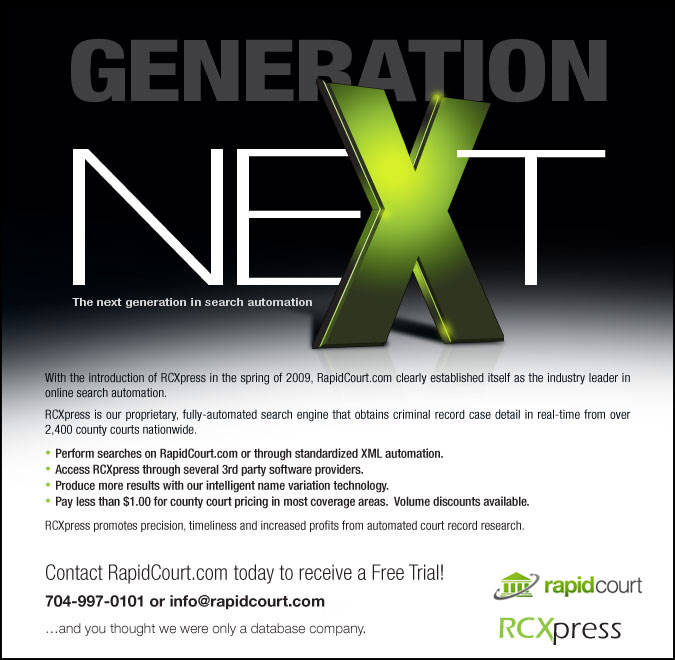
Public
Record Update
By Mike Sankey, PRRN
| BRB's
FREE RESOURCE CENTER |
For the MOST
COMPREHENSIVE RESOURCE describing all access methods, restrictions,
fees, and search procedures on over 26,000 government and private
agencies visit the Public Record Research System (PRRS-Web) .
We provide the extensive details and in-depth data you will not
find doing a Google search!
For more
information contact Michael Sankey at mike@brbpublications.com
or visit www.brbpublications.com/updates.aspx

Compliance with the myriad of state laws is a complex
subject affecting CRAs and their clients. The State Rules Register
provides an uncomplicated explanation in plain English of state
laws for what is reportable to the client, usable by the client,
and the necessary steps to take to be in compliance with state
laws. Also included are best practices, practical tips, and ongoing
notification when state and federal laws change. Create your own
matrix reports. Use the special Resource Tabs of Guidelines and
Special Instructions.
For more
information contact Michael Sankey at mike@brbpublications.com
or visit www.brbpublications.com/updates.aspx


NAPBS 10th Annual Conference
September
15 - 17, 2013 Phoenix, Ariz.
The NAPBS Annual Conference is the place
for industry specific education. Educational session topics include:
Overview of the State and Federal Legislative and Regulatory Climate,
Mexico Data Privacy Introduction - Essentials for US and Global
Screening Compliance, Navigating through Volunteer Screening,
Risk Mitigation/Litigation Avoidance for CRAs, The New Gold Standard:
Hair and Oral Fluid Drug Testing, and much more.
For the full,
tentative schedule click
here. Register here

Chequed.com and SmartRecruiters Integrate Hiring Solutions to
Cut Cycle Time and Improve Quality of Hire
Chequed.com,
Inc., the leading provider of cloud-based Predictive Talent Selection™
solutions, and SmartRecruiters, the hiring platform, today announced
an integrated assessment-based hiring solution with ChequedReference™.
Through this unique alliance, customers will utilize automated
reference checking to improve candidate quality and further streamline
their talent acquisition processes to generate the greatest Return
on Hire™.
"This integration
of reference assessment content excellence within the SmartRecruiters
hiring platform is a win-win for customers. By embedding automated
reference checking tools into the hiring flow, organizations have
one of the greatest opportunities to improve candidate fit, which
minimizes turnover and maximizes productivity. We look forward
to making reference checks easy for all hiring businesses." The
integration brings ChequedReference™ Predictive Talent Selection™
assessment-based solution to SmartRecruiters' all-encompassing
hiring platform, which provides more than 45,000 social enterprises
the ability to source, engage and hire top talent.
Read more



U.S.
CFO Economic Optimism Improves Entering Second Half of 2013
Top financial
decision makers in the U.S. share an optimistic outlook towards
the sustained economic recovery and opportunities for their businesses,
according to findings from the most recent survey of Chief Financial
Officers conducted by Financial Executives International (FEI)
and Baruch College'sZicklin School of Business. Despite concerns
about the risks and costs associated with healthcare, CFOs maintain
a more positive perspective as they enter the second half of 2013
than they did previously, especially towards hiring and employment
opportunities.
Read more

Corporate
Directors Predict Economic Growth in 2014
An ongoing
survey by the National Association of Corporate Directors
(NACD) shows corporate directors continue to feel positive
about the economy and in hiring in 2014. NACD's Board
Confidence Index (BCI), which takes the economic
pulse of the director community quarterly, showed a score of 63.1-a
score above 50 indicates a positive outlook on the markets.
The view
on hiring follows suit with the steady positive economic outlook,
with 34 percent of respondents expecting to increase their workforce
in the next three months compared with 32 percent in Q1. "Although
the economy is still recovering, the relatively stable director
confidence in the markets and in hiring are encouraging signs,"
said Ken Daly, president and CEO of NACD.
Read more

STOP
STRUGGLING WITH WRITING AND PUBLISHING YOUR NEWSLETTER: |

We can help
you have a high quality e-newsletter to help nurture your relationship
with your clients and attract new clients. Our customized newsletter
service will take over your newsletter task or create a new one
for you. We can manage the creation of your newsletter for you.
We are constantly
researching information to use for The Background Buzz and
you can put our research to use for you. Using the information
rich content from The Background Buzz (minus the ads
and competitors information) we will create a custom newsletter
for you.
Use your staff’s
time to do more valuable work and save all the hassle of researching
or writing articles, formatting and managing all the other ezine
tasks with our customized ezine process.
Contact Barry
Nixon at 949-770-5264 or at wbnixon@aol.com
for more information.

For
Hire: Professional Liars for Job Seekers
Paladin Deception Services, founded by former private detective
Timothy Green, claims to run a company in Forest Lake, MN that
will lie to anyone about anything, advertising its services for
$54 per month. Green says customers run the gamut -- from cheating
spouses in need of alibis to people playing hooky from work. But
the real demand comes from job seekers, making up more than 60%
of what he says are its 250 to 300 monthly clients. "We can replace
a supervisor with a fictitious one, alter your work history, provide
you with a positive employment reputation, and give you the glowing
reference that you need," Paladin's website states. Green is adamant
that nothing his company does is illegal. CareerExcuse.com, The
Reference Store, and Fake Your Job are also in the business of
offering fake references for job seekers. But the lies these companies
pitch could have serious ramifications for a job seeker. Many
hiring departments already take additional steps to verify references
listed by applicants. And even if a fibber does get hired, it's
hard to keep up the act. Coworkers find out the truth or a boss
realizes that the employee's skills don't match the qualifications
that the fictitious reference raved about. And while it's unlikely
the employee would face legal action if they are discovered, they
can count on being fired.
Read
more

How Employers Can Fight Back Against Fake Job References
Many businesses
now offer fake job reference services to people looking to fudge
the truth when searching for employment. Clearly, many businesses
still rely heavily on references when they are evaluating potential
hires, and there are lots of fake references being listed. According
to a study by employment services company CareerBuilder, about
30% of employers surveyed reported that they have caught a fake
reference on a candidate's application. In addition, 80% of employers
reported that they contact references when evaluating potential
employees, and 16% contact references even before they call the
candidate for a job interview. One obvious thing companies can
do to avoid the problem of fake references is to not place so
much importance in the references candidates provide when they
apply for a job. References can be easily manipulated and are
mostly positive because people don't like to give critical feedback
for legal reasons. Experts say recruiters and HR departments should
take advantage of legitimate online resources such as LinkedIn
and other business social media sites. Another way to vet references
is to engage a reputable background vetting service.
Read more

 Kevin Coy is a Partner in the Washington DC office of Arnall
Golden Gregory LLP. Kevin advises background screening
companies and other clients on a wide range of privacy and consumer
regulatory issues, including Fair Credit Reporting Act, Gramm
Leach Bliley Act, Drivers' Privacy Protection Act, and Dodd Frank
Act compliance issues, as well as data breach matters. Kevin also
represents clients with matters before the Federal Trade Commission,
the Consumer Financial Protection Bureau, and other consumer protection
agencies.
Kevin Coy is a Partner in the Washington DC office of Arnall
Golden Gregory LLP. Kevin advises background screening
companies and other clients on a wide range of privacy and consumer
regulatory issues, including Fair Credit Reporting Act, Gramm
Leach Bliley Act, Drivers' Privacy Protection Act, and Dodd Frank
Act compliance issues, as well as data breach matters. Kevin also
represents clients with matters before the Federal Trade Commission,
the Consumer Financial Protection Bureau, and other consumer protection
agencies.
Kevin can
be contacted at Kevin.Coy@agg.com
or 202-677-4034.
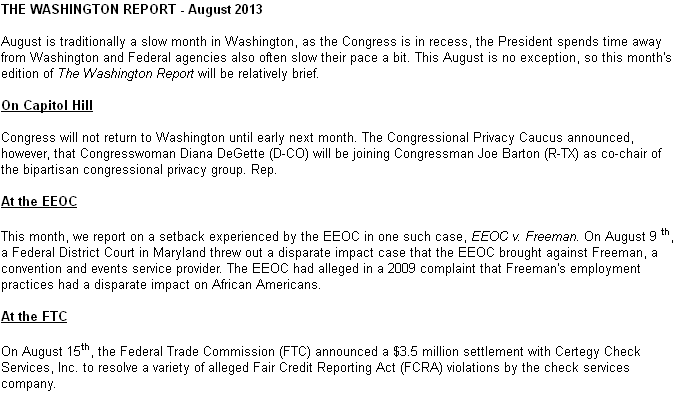
Read
the full report

One
Site! Many Suppliers! |
VISIT
THE NEW SUPPLIER/PROVIDER SECTION ON
PREEMPLOYMENTDIRECTORY.COM
Looking
for the Top Suppliers in the Industry? Need to find a new Supplier?
Visit our VENDOR
SHOWCASE which features suppliers to the Background
Screening Industry.
Suppliers
to the Background Screening industry Guide Now Available!
Click
here or on image to get a copy
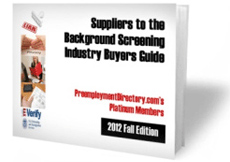
Contact
Barry Nixon at wbnixon@aol.com
for information on getting your firm listed in the


Real-Time
References
Reference checking is the bane of many an HR professional's existence.
A solution, online reference checking, is now at hand. Every human
resource executive is well aware of the problems related to reference
checking -- the seemingly interminable phone tag, the equivocal
responses, and the difficulty comparing references coming from
different referrers of different candidates. In addition to shortening
the time frame, online reference checking also seems to result
in more honest appraisals. Many talent-acquisition professionals
and analysts say online reference checking is fixing a process
that had been broken for years, but no one knew what to do about
it. The online process is virtually automatic for the hiring company,
easy for the candidate and quick for the reference. Many people
no longer pick up their phones unless they expect a call, they
don't have the time or inclination for free-form reference questions
and they're worried about angering the candidate or inviting litigation
if they give a less-than-stellar rating. So, any HR executive
who finds those problems of telephonic checking familiar might
consider an online service as an effective and easy-to-implement
solution. While online reference checking may not be a good fit
for all companies, and certainly not for all hires, many HR professionals
find them much more effective than telephone reference checking.
Read
more


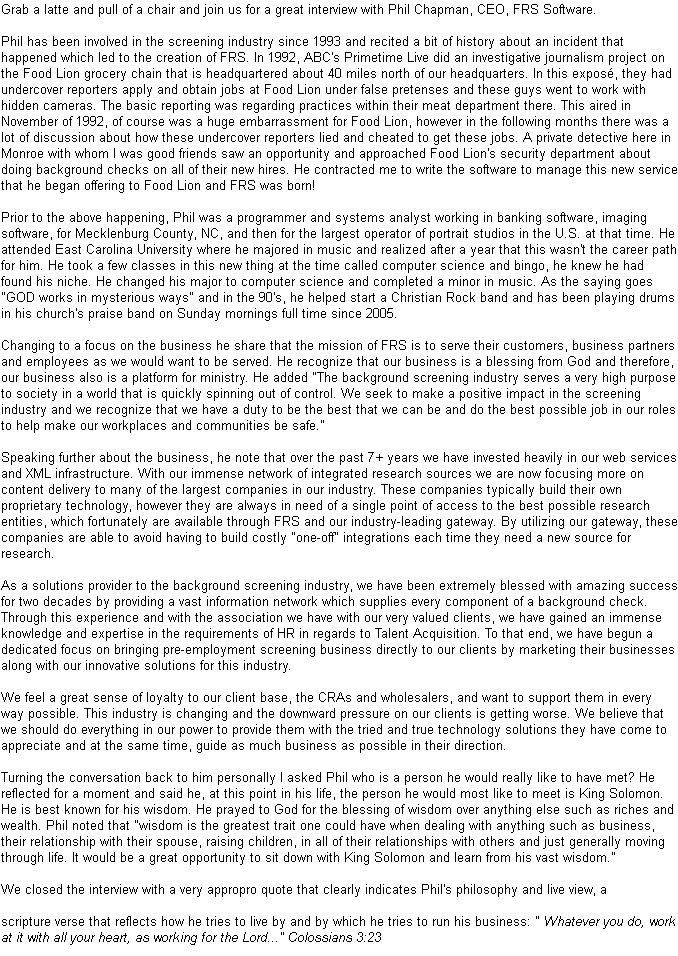
For more
information about FRS go to www.frssoftware.com
contact Phil at pchapman@frsssoftware.com



North
Carolina Joins Growing List of States Mandating Employer Use of
Federal E-Verify System
In light
of growing dissatisfaction with the federal immigration system,
various states have taken matters into their own hands in an attempt
to limit employment of unauthorized aliens. North Carolina has
joined the fray, and on July 1, 2013, its E-Verify requirement
went into effect for all private employers of 25 or more employees.
These employers must now use the federal E-Verify employment eligibility
verification system to check work authorization for all new hires.
Use of E-Verify offers employers a safe harbor against a later
finding that a worker was in fact unauthorized. But there is a
catch: before using E-Verify, an employer must sign a non-negotiable
Memorandum of Understanding (MOU) with the DHS. In the MOU, the
employer waives its right to a three-day advance notice of an
I-9 audit. This means an employer faces the risk of an unannounced
visit from ICE without the ability to prepare in advance. Maintaining
compliance in North Carolina will require employers to retain
verification records during each employee's employment and for
one year after employment ends. Employers do not need to verify
work authorization for seasonal or temporary employees who are
employed for 90 or fewer days during a 12-month period. The law
provides for penalties for employers who fail to use E-Verify,
starting with $10,000 for the first violation, with additional
penalties for subsequent violations.
Read more

| INTERNET
MARKETING TIPS FROM INTERNET MARKETING GURU 'SANTA' ED
TAYLOR |
Google says mobile websites must load
in 1 second
Google wants to deliver the best websites for the people who use
their search engine. This is true both of traditional websites
and of mobile sites. Below I have provided you links to 2 pages.
One will help you understand what Google is looking for and the
other will help you to get it done. Here [...]
Read More>>>
If you have
any questions about this post, getting help with your Internet
marketing or anything at IMGmembers.com
please send Ed Taylor an e-mail or call us at 541-482-4840.
You can also
access his free Internet marketing course at- http://imgmembers.com/free-e-course/



| ASIA
PACIFIC AREA COUNTRIES |
IBM Gets Certified Under APEC Privacy Rules
IBM has announced
it has achieved certification under the Asia-Pacific Economic
Cooperation (APEC) Cross-Border Privacy Rules (CBPR), the first
company to do so, according to a press release. The CBPR system
is designed to facilitate data flows between the U.S. and the
other APEC member economies, through voluntary, enforceable codes
of conduct. IBM Chief Privacy Officer Christina Peters, CIPP/US,
said, "CBPR rules will become the foundation of a globally accepted
system that enables data to be shared throughout different regions
with strong and trustworthy privacy protections." Hogan Lovell's
Partner Christopher Wolf told The Daily Dashboard, "APEC
CBPRs, containing enforceable commitments for the protection of
personal data, are a lot like BCRs (binding corporate rules) that
the EU recognizes as sufficient for cross-border transfers. Their
adoption and effectiveness suggests that the EU should move its
focus from the adequacy of the U.S. legal framework to whether
personal data is being adequately protected through mechanisms
like the CBPRs."
Read
more
Adverse Action Update: The Privacy Act Did Not Give a Worker a
"Workplace Right"
In the case,
Austin v Honeywell Ltd, the Federal Circuit Court determined
that the Privacy Act 1988 (Cth) is not a "workplace law" for the
purpose of protecting a person against adverse action under section
340 of the Fair Work Act 2009 (Cth) (Act). However, the judge
conceded that a provision within an Act or regulation could regulate
the relationship between employers and employees even though the
Act or the regulations as a whole did not do so. In any case,
the Judge found that the employer had discharged the onus of proving
that it had terminated her employment because of her attitude
to her manager and not because she had commenced an adverse action
claim. Not all statutory rights amount to workplace rights granting
protection against adverse action. Whether a workplace right exists
depends on whether the provision or Act is aimed at regulating
the relationship between employers and employees. The Privacy
Act was held not to be a workplace law, therefore it did not give
rise to a workplace right.
Read
more

The
Case for Hiring Ex-offenders
According to management expert James Adonis, there are pros and
cons to hiring those with a criminal record. On the one hand,
he points out the perils to society if managers universally refused
to do so. "The result would be that convicted criminals, or at
least those who've been to jail, would either remain on perpetual
welfare or fall into the recidivism trap," said Adonis. And on
the other hand, he sympathises with those who would have concerns
hiring an ex-offender. "Being in business is risky - hiring employees
even riskier - and so it makes sense, in a way, to minimise that
risk by disqualifying those with a crooked history." One example
of a successful rehabilitation programme that Adonis highlighted
is run by the Royal Society for the Prevention of Cruelty to Animals
(RSPCA). Under this scheme, some prisoners undertake an animal
training course to learn how to work with dogs that have behavioural
problems. They earn nationally recognised qualifications and vocational
skills that will assist them in finding employment once they have
left prison. "The success of the programme demonstrates that with
the right training and supervision prisoners have the potential
to become fine workers." The rate of recidivism in Australia sits
at 60%, but the Australian Institute of Criminology has said that
the figure can be halved if prisoners are given vocational education
and are assisted into employment.
Read more

Lost in the Privacy Landscape
Australia's
privacy and data protection laws are hard to explain and often
poorly understood. The first challenge is to explain that the
Australian Privacy Commissioner sits in the Office of the Australian
Information Commissioner (OAIC) and applies laws that the Australian
parliament has misleadingly called 'principles'. The second challenge
is describing how to read principles as laws and fit them together
with other provisions in the Privacy Act that clearly are drafted
as laws. And then there's the difficulty of trying to interpret
these provisions when dealing with novel issues such as cross-border
cloud deployment and access to personal information held in another
jurisdiction (or jurisdictions unknown), geo-tracking of devices,
data warehouses, virtualised servers, big data and customer data
analytics. Privacy and data protection in Australia has become
a confusing landscape, with forests of regulation to get lost
in, unexplored corners and many poorly understood rules. At a
time when privacy and information security is becoming a major
area of concern for governments, businesses and consumers, it
is unfortunate that Australia has created such a confusing thicket
of regulation and quasi regulation.
Read
more

Tread
Carefully When Checking Civil Litigation History
Checking
publicly available civil litigation information may ensure organisations
safeguard themselves against hiring people found negligent or
liable by a civil court, but involves a whole host of limitations
and risks.
Last year,
Queensland Health was held to account over having employed an
IT manager for five years who had previously been the head of
an internet services company which was ordered to pay $210,000
worth of damages for using pirated software in 2001. (Related
article:
Disclosure of civil law breaches in question ). A check of
litigation records may have allowed it to avoid getting into this
difficult situation. However, checks of civil proceedings may
identify cases that would be considered a 'spent conviction' in
a criminal history search, and therefore cannot be considered
by an employer.
Background
screening firm Verify said court record checks are in their infancy
and databases only list more high-profile cases, writs, summons,
things such as credit defaults, and cases not marked as private."Court
records are not as foolproof as we'd like them to be and need
to be strengthened with other searches. There is no central database
for court record information and each court processes information
differently," manager Hosay Mangal from Verify said.
Read more
New
Amendments to Austrian Data Protection Law
The Austrian
Data Protection Act (DPA) has been substantially revised for the
first time since becoming effective in 2000. The revised DPA introduced
a "data breach notification duty" to the Austrian data protection
regime, which is similar to the respective obligations under U.S.
and UK data privacy laws. With this, Austria (in addition to Germany)
is one of the first Member States to implement such an information
duty. In a nutshell, this obligation requires every data controller
in Austria to inform data subjects properly if he becomes aware
of a systematic and seriously unlawful misuse of their data. The
revised DPA also provides for new provisions about the processing
of personal data in the course of videotaping / video monitoring,
the data subjects' rights of data access, and a new approach of
self registration through the data controller combined with a
massive extension of the authority's competencies. The administrative
fines for breaches of the DPA were also raised to a maximum penalty
of EUR 25,000 for deliberate violation of those provisions and
EUR 10,000 for violation of the notification and information obligations
of the DPA.
Read more
Mid-Employment Checks in Canada Legal but Complicated
In the aftermath
of a recent decision by a Canadian government institution to perform
mid-employment background checks, Canadian HR professionals are
saying that while the practice is legal, companies conducting
such checks should proceed with caution. "…it opens the
door for discrimination," said an HR business advisor based in
Toronto. "Depending on the purpose and how it is applied, it might
discriminate on long-term employees with good performance, sometimes
with minor records that have no effect on their work." Canada
Post announced in March 2013 that it would implement the new screening
practice for its employees, which would allow them to perform
background checks on current employees every 10 years and gives
the organization authority to change the frequency of employee
screenings at any point. "The Canadian Union of Postal Workers
(CUPW) opposes this policy of mid-employment checks primarily
because it's a breach of members' privacy and also because Canada
Post has not been clear and specific about the scope, requirements,
process or intent of the checks," said Gayle Bossenberry, CUPW's
first national vice president. The impact of the mid-employment
background check on current Canada Post employees depends on how
the postal service implements a review program with its employees
and how it plans to take action on the results.
Read
more

Employer's Random Alcohol Testing Policy Constitutes Unreasonable
Invasion of Employees' Rights to Privacy
An employee's
right to ensure workplace safety versus an employee's right to
privacy, have been competing rights present in the workplace for
many years. In Communications, Energy and Paperworkers Union
of Canada, Local 30 v. Irving Pulp & Paper Limited, the
Supreme Court of Canada (SCC) recently weighed in on how to balance
these rights in the context of an employer implementing a drug
and alcohol testing policy. In this case, a majority of the SCC
favoured employees' privacy rights. Key in the majority's decision
was that the employer could not demonstrate the necessary safety
concerns to justify the random alcohol testing component of its
policy made on employee privacy. As such, the testing was found
to be unlawful. While Irving does not produce an ideal result
for employers who understandably see the safety and deterrence
benefits that random alcohol testing provides, it is important
to stress that Canada's highest court has not prohibited such
testing in its entirety. Rather, employers with dangerous operations
who wish to unilaterally impose such a policy must adequately
justify and substantiate the policy's reasonableness through verifiable
evidence that the workplace in question has problems with alcohol
use.
Read more
Colombia Adopts Regulations to Implement its
Data Protection Laws
With the
advent of new rules regulating the protection of personal data,
companies with operations in Colombia must implement policies
and practices to comply with Colombia's privacy law. In October
2012, Colombia enacted Law 1581 to regulate the protection
of personal data and safeguard the constitutional right of privacy
in the midst of the challenges posed by globalization and new
technologies that enable the easy electronic transfer of personal
data. On June 27, 2013, Colombia's executive branch issued Decree 1377 ,to implement various
provisions of Law 1581 and went into effect immediately. Law 1581
is part of a growing trend in Latin America to establish broad
data protection regimes. Under the Political Constitution of Colombia
of 1991, all citizens have an inviolate fundamental right to personal
and familial privacy and to the protection of their good name.
It is expected that the Superintendency of Industry and Commerce
(SIC) will conduct inspections to monitor compliance, placing
special focus on the health and financial industries, given these
industries' reliance on collecting and processing personal data
to conduct their activities. Therefore, employers must comply
with the privacy law when collecting or processing personal data
and to transfer it outside of Colombian borders.
Read more
EU
Needs 'German Standards' on Data Privacy
In response
to the recent disclosures of the U.S. National Security Agency
surveillance programmes, German Justice Minister Sabine Leutheusser-Schnarrenberger
said EU data privacy rules should be as strict as those found
in Germany. "High German data protection standards should be the
rule," she said. "U.S. companies that do not uphold these standards
should be banned from the European market." Leutheusser-Schnarrenberger,
who has strongly criticized the scope of the U.S.' spying programme,
noted that it should not be intelligence services that set the
standards for data protection but rather "citizens' basic rights."
The EU is currently updating its data privacy legislation with
the draft rules under scrutiny in the European Parliament. "If
a European data security sphere is to be created, then it needs
stronger parliamentary control over secret services and regular,
intensive information exchanges between supervisory committees,"
said Leutheusser-Schnarrenberger. In Germany, where data privacy
is highly valued, the issue has moved onto the political agenda
ahead of elections in September.
Read
more
Consultation
on the Conducting Privacy Impact Assessments Code of Practice
The UK Information Commissioner's Office (ICO) has published
a consultation on a new privacy impact assessment (PIA) code of
practice and released a study on PIA and risk management. The
ICO first announced the study, conducted by Trilateral Research
& Consulting, was underway back in January. The new code of
practice on conducting privacy impact assessments (PIAs) is intended
to replace the current PIA Handbook. The aim of the new code is
to produce a practical guide, which will help organisations conduct
assessments of new projects that involve the use of personal information.
The code explains the key principles behind a PIA and suggests
how a PIA can be integrated with an organisation's project and
risk management processes. The closing date for the consultation
is 5 November 2013.
Read
more

Competition to Offer Privacy Protections Could Help Deflect Regulatory
Action to Other Markets, Says ICO
Companies operating in markets in which businesses can gain a
competitive advantage from offering enhanced privacy protections
to customers are less likely to be the subject of enforcement
action over breaches of data protection laws, the Information
Commissioner's Office (ICO) has said. The UK's data protection
watchdog has published a Data Protection Regulatory Action Policy
that sets out the factors it will take into account when deciding
whether to initiate regulatory action. The ICO said that it will
be selective about which breach cases to pursue regulatory action
in and that "market factors" could influence its decision whether
to take up an investigation. "Our approach will be driven by concerns
about significant actual or potential detriment caused by non-compliance
with data protection principles, the PECR (Privacy and Electronic
Communications Regulations) or other relevant legal requirements,"
the ICO's Policy said. "The initial drivers will usually be: issues
of general public concern; concerns that arise because of the
novel or intrusive nature of particular activities; concerns raised
with us in complaints that we receive; and concerns that become
apparent through our other activities." Under its existing information
rights strategy, the ICO pledged to focus its regulatory attention
on organisations operating in the health, credit and finance,
criminal justice, Internet and mobile services and security sectors.
Read more

Employment
Agency For Ex-Prisoners Launched
A temporary
recruitment agency has been launched to help provide temporary
employment opportunities for prisoners upon their release. Established
by Kate Beech, who has 20 years' experience in recruitment, and
Her Majesty's Prison (HMP) Featherstone, the new company Chance
(2013) Ltd. aims to support former prisoners into work. Beech
said the level of skill and qualifications of many of the prisoners
was often ignored due to their criminal background. During their
time in prison, however, she said many of them had developed a
strong desire to work and even in some cases start a new career.
For some, they want to return to the jobs they successfully held
before being convicted. "The relationship between [the] staff
at Chance and [the] prisoners is built up over the final three
months of their sentence so we are confident we [can] place them
with the appropriate employer and within the right industry,"
said Beech. She adds: "This recruitment process means they will
come out paying National Insurance and paying their own rent rather
than relying on benefits until they find a job which may never
happen on their own." Beech is also working with charities and
rehabilitation groups to offer general support to the prisoners
when they are released.
Read more

Fraud Landscape Tips
Use of fake
identity details, or the impersonation of an innocent victim (identity
fraud) now accounts for 52% of all fraud. That is according to
frauds recorded by cross-sector members of CIFAS - the UK fraud
prevention trade association, during the past 12 months. "CIFAS
has long highlighted that data is the cornerstone of the fraudster's
trade," said Richard Hurley, CIFAS Communications Manager. "With
two thirds of all recorded fraud now relating to the abuse of
identity details, the message is clearer than ever,
said Hurley. "Organisations and individuals must develop new ways
of safeguarding their personal data, otherwise they effectively
provide the fraudster with a licence to steal money." CIFAS says
that you can reduce the risk of your details falling into criminal
hands by keeping your personal details to yourself. Here are some
tips: Treat your personal details as something to be looked after.
If you use social networking sites, limit the amount of information
you give away and activate tough privacy settings. Only enter
your personal details into secure websites belonging to organisations
you know and trust. Make sure your computer has an up-to-date
firewall and is protected by anti-virus and anti-spyware programmes.
"Organisations must always play their part, and CIFAS always calls
for them to invest in strong preventative measures to combat fraud,"
adds Hurley. "But there is much that individuals themselves can
do to help."
Read
more
|
ADVERTISERS IN THIS EDITION |
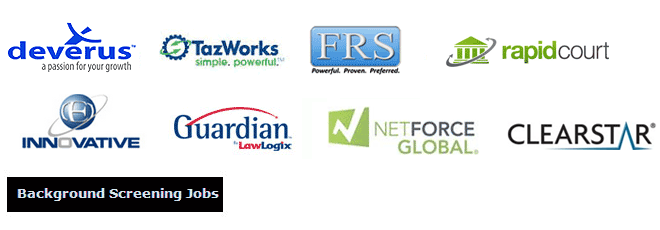

|  |
|
|
| |
|
Background
Screening Jobs |
|
Visit
the Job Board for the Employment and Tenant Screening Industry.
Here you will find resumes of people with industry experience
and employers seeking applicants with experience in Employment
and Tenant Screening and related businesses.
www.backgroundscreeningjobs.com


|
UPCOMING CONFERENCES, COURSES & EVENTS |
Feature
Education:
 |
FCRA
Basic Certification Webinar Series Update
The
FCRA Basic Certification program series is now available
for purchase.
For
more information |
2013 Events ( Click
Here to View full list of Events ) - Updated
Monthly
SHRM
State Conferences, visit
http://www.shrm.org/Conferences/StateAffilliateConferences/Pages/default.aspx
Drug
and Alcohol Testing Industry Association (DATIA), 2013 Training
Course Schedule, visit
http://datia.org
SAPAA
Training Institute Learning Events, http://www.sapaa.com/
CUPA-HR
Conferences: http://www.cupahr.org/
World
Federation of People Management Associations, Events,
http://www.wfpma.com/events/by-region#quicktabs-tab-view__events__page_3-4
|
 Bonzour! (it sounds kind of like
'bonn zhu' not how it's written.
Bonzour! (it sounds kind of like
'bonn zhu' not how it's written. 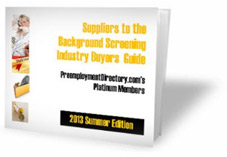 Suppliers we will are finalizing the
next edition of the Suppliers to the Background Screening
Industry Buyers Guide so contact us immediately to
be included. I have enclosed the
Suppliers we will are finalizing the
next edition of the Suppliers to the Background Screening
Industry Buyers Guide so contact us immediately to
be included. I have enclosed the 

 A Star Walks Among Us
A Star Walks Among Us










 Kevin Coy is a Partner in the Washington DC office of Arnall
Golden Gregory LLP. Kevin advises background screening
companies and other clients on a wide range of privacy and consumer
regulatory issues, including Fair Credit Reporting Act, Gramm
Leach Bliley Act, Drivers' Privacy Protection Act, and Dodd Frank
Act compliance issues, as well as data breach matters. Kevin also
represents clients with matters before the Federal Trade Commission,
the Consumer Financial Protection Bureau, and other consumer protection
agencies.
Kevin Coy is a Partner in the Washington DC office of Arnall
Golden Gregory LLP. Kevin advises background screening
companies and other clients on a wide range of privacy and consumer
regulatory issues, including Fair Credit Reporting Act, Gramm
Leach Bliley Act, Drivers' Privacy Protection Act, and Dodd Frank
Act compliance issues, as well as data breach matters. Kevin also
represents clients with matters before the Federal Trade Commission,
the Consumer Financial Protection Bureau, and other consumer protection
agencies. 









